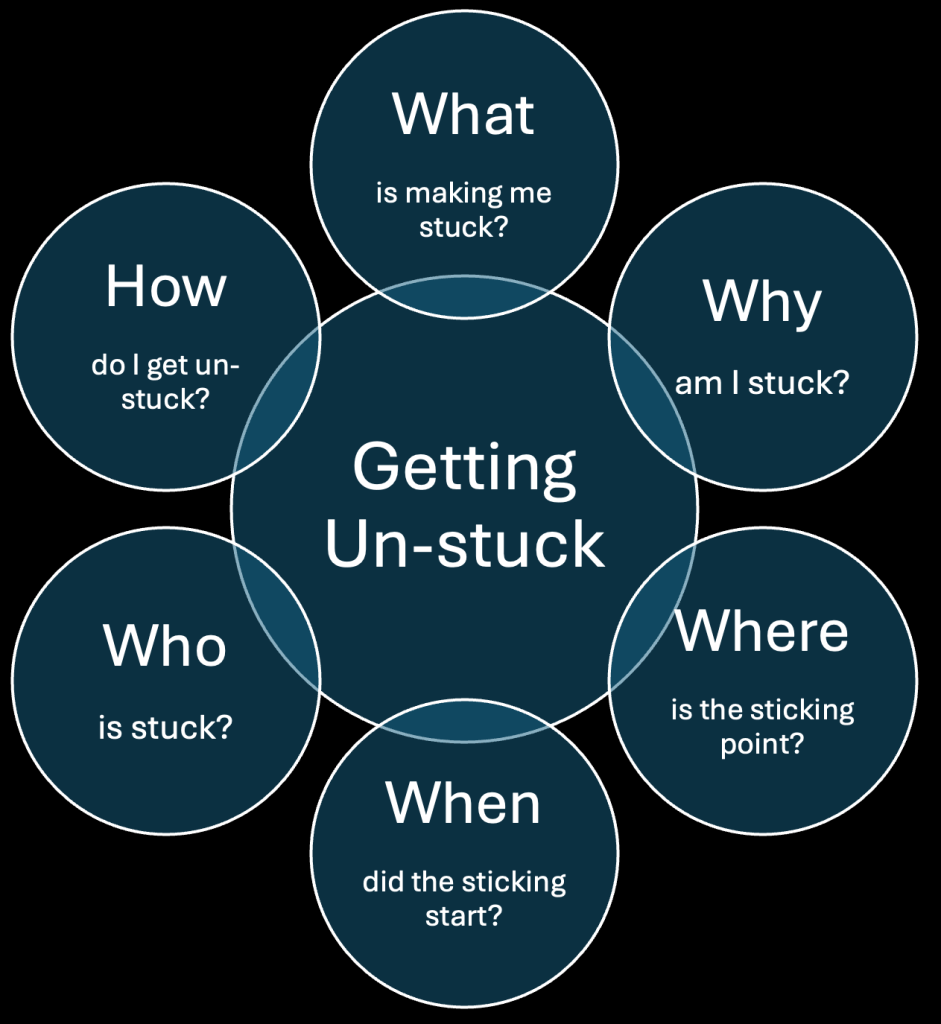Helpful questions to get you un-stuck and on the path to your goals

This post was first published on my Medium blog—follow me there for the most up-to-date entries!
We’ve all felt stuck at some point in our lives. Maybe we’re facing a problem that needs to be solved, or a decision that hasn’t been made. (Yes, those are different.) It could be a not-yet-present opportunity, or an adversity that hasn’t yet been overcome. Perhaps it’s just an everyday nuisance, like a printer that won’t print. Or it could be a life-altering event, such as losing a job or having a seriously ill child. In all of those situations when you feel stuck, you’re wondering how to get out of the quicksand.
I posit that if we listen, our intuition will speak and help us to know exactly what to do. We can get un-stuck by asking ourselves the six questions in Kipling’s Six Serving Men: What, why, when, how, where, who?

What is making me stuck?
Most of us are masters at saying, oh, it’s the corporate policy, it’s the country’s economy, it’s the weather, it’s my lack of skills or network, it’s the culture or the history. It’s my old age or arthritis. But blaming doesn’t work to get us unstuck.
Broader questions would serve us better. Start by asking: Is this “sticking” a reality, or perception? I heard NYT best-selling author Michael Hyatt tell the story that even after he shut off the invisible fence, took off the collar, stopped the shocks, and bribed with treats (including raw meat), he simply could not get his dog to cross the line of the invisible fence. (Matthew Kent gives the details.) The physical barrier wasn’t there. Hyatt’s question to me and his other coaching clients was, “What if the barrier is only in your head?”
Also, ask yourself if the most obvious obstacle is the true or the most disabling obstacle. As a seasoned clinical nurse specialist, I’ve seen more than my share of physical obstacles that patients have faced. But often, the physical obstacle — although very real — is not their major obstacle. Often, it’s the story in their head, such as “I’m too old” or “the doctor can’t help me,” or they simply enjoy the sick role.
Why am I stuck?
I offer weekly and quarterly productivity coaching to a small mastermind group of goal-oriented professionals. When they say they didn’t meet their goals, I ask them why they think that happened. Their answers almost always boil down to one of three reasons:
- Skill: They simply didn’t have the know-how to do what they needed to do. That doesn’t mean they can’t do it; it means they are temporarily at a standstill. It might be a matter of learning how to create a more effective website, or how to earn passive income, and although it feels like being “stuck” it’s really just being stalled. Skills can be acquired.
- Motivation: Sometimes, people aren’t motivated because they’ve picked a goal the world wants them to achieve, but which doesn’t give them any joy. Or, they are stalled by using a productivity technique that doesn’t work for the situation, which can be very de-motivating. Like lack of skill, weak motivation won’t get us totally “stuck,” but it’s a serious roadblock.
- Inaction, or discouragement with outcomes. When you feel stuck it’s tempting to think that you can’t achieve your goal without generating a grandiose plan. But that’s just not the case. Martin Luther King famously said, “Faith is taking the first step even when you don’t see the whole staircase.” We often think of faith in God or faith in others or faith in the efficacy of equipment or medications or systems. But having faith in ourselves is a critical starting point. And if we fail the first several times we try, we might fall into the trap of losing faith in ourselves. But allowing our past to predict our future keeps us stuck. Depending on how we react to that failure, it can result in a momentary stall-out, or a lifetime of being stuck.
Where is the sticking point?
Sometimes we feel like we’re completely stuck with “everything.” But that’s likely to be an exaggeration. Florence Scovel Shinn says that perfect happiness is health, wealth, love, and perfect self-expression. When you feel stuck and unhappy, it’s worth considering which one(s) of those four is bothering you.
Health could be physical or emotional. But it could also be something deeper, like spiritual health, or unhealthy reactions or behaviors that stem from cognitive distortions. (Do we think about that?)
Wealth is often related to our job, yes. But it may be related to our ability to balance spending and saving money, or making good decisions about how to get money to work for us rather than thinking of ourselves as working for money. If we feel stuck with “not enough” money, we need to take a better look at our relationship with money.
People think they are stuck when, for one reason or another, they can’t find romance. But romantic love isn’t the only kind of love that’s important for our lives. The ancient Greeks had 8 different words to describe love. We can get so carried away mourning the lack of a romantic love that we forget that we can — and probably do — have an abundance of love in our lives. Instead of focusing on a lack of romance, we can look at the other kinds of love in our lives. We can nurture, center, and strengthen those existing relationships rather than focusing on something missing.
According to the American Psychological Association and multiple other sources, self-expression is “free expression of one’s feelings, thoughts, talents, attitudes, or impulses through such means as verbal communication; the visual, decorative, literary, and performing arts; and other commonplace activities (e.g., gardening, sports).”
How does your self-expression (or lack thereof) affect you? Bottling up your feelings has multiple scientifically proven adverse effects. If you sit still and shut up when you see a better way to go, you’re contributing to inferior outcomes or at least to inertia. If you’re not using your talents to make the world a better place, neither you nor anyone else is reaping the benefits of those talents. (Consider finding a coach who specializes in helping people use their natural Clifton Strengths.)
When did the sticking start?
Sometimes we get stuck when some outside force happens. If we know that, we have a better understanding of what triggered our “stuck” situation, and we find a way to jump over, crawl under, run around, or tunnel through those obstacles.
We all have triggers that keep us moving, and similarly, triggers that keep us stuck. Knowing what they are can help us to use the cues that work to our benefit and avoid, or at least minimize, the situations that push our buttons.
Who is stuck?
Oh, you didn’t see that coming, huh? Gotcha. Let me explain.
Who we are, or rather, who we think we are, can explain the basis of our “stuck” situation. Who do I say I am? What is my self-identity? Am I who I was a year ago, or am I, as Dr. Ben Hardy would say, my Future Self? In his book of that title, Dr. Ben Hardy says, “Start with what you want and work backward. Think and act from your goal, rather than toward your goal.”
In his book You Are a Writer, Jeff Goins said, “Believe you already are what you want to be. And then start acting like it.” Decades ago, we learned the same thing from world boxing champion Muhammed Ali, who famously said, “I am the greatest; I said that even before I knew I was.” He didn’t see himself as a poor dyslexic kid who struggled in school, but as the champion he knew he could become.
Perhaps the biggest thing that keeps us stuck is our own self-concept and our own thinking. In his book Acceptance and Commitment Therapy, Steven C. Hayes explains that our self-talk, developed at the time we start using language, can keep us stuck. As Buddha said, “What we think, we become.” Similarly, James Allen said, “Man is made or unmade by himself.”
We get stuck when we ruminate on what’s wrong, or when we worry about what has been or what is yet to come. Credited to several famous people, this quote can help us to get unstuck from worrying about our past or catastrophizing about our future.
Yesterday is history. Tomorrow is a mystery. Today is a gift. That’s why we call it the present.
Similarly, plastic surgeon and author of Psycho-Cybernetics Dr. Maxwell Maltz tells us that our self-image is central to our success or failure. As Kulwant Saluja nicely summarizes, Maltz explains that “self-image acts as a psychological thermostat that dictates their behaviors, actions, and level of achievement.”
How can I get un-stuck and stay un-stuck?
Awareness is the first rung we’ll ever climb on the ladder of universal growth process. I find that simply asking myself the questions is the first step to helping me unstuck.
When you feel stuck, do whatever you need to do to answer your own questions. I like to do anything that helps me to think differently. That might include:
- Writing to get unstuck and find our own solutions. As Joan Didion said, “I write entirely to find out what I’m thinking, what I’m looking at, what I see and what it means. What I want and what I fear.” That’s exactly why I journal almost daily and blog weekly. And, silly as it may sound, I sometimes write my problem or decision on a piece of paper, place it on a table, and walk around the table. Doing so helps me to see things from a different perspective — literally. Maybe it’s the walking that helps, or maybe it’s just forcing myself to focus on one thing for a few minutes.
- Listening to binaural beats. Yes, there is some serious science to show the efficacy of this, and for me, it works amazingly well. Every day, I use the beats from the EOC Institute. (I have no affiliation with this company, I just love what the product does for pennies a day.)
- Talking to a coach or a therapist. Sometimes, words come out of my mouth that I didn’t know I had floating around in my head.
- Knitting. Yeah, I know, this sounds silly! But Betson Corkhill has conducted research studies showing that knitting can “stop ruminative thoughts” and hence pull us out of out that negative thinking rut; it enhances good neural pathways and helps our subconscious to work better.
Get un-stuck today
As in the past and in the future, the world has all kinds of obstacles. We can see them. And we can see ourselves as stuck. I’ve been there, and to some extent, I’m still there. But I’m passionate about getting people un-stuck, whether it’s a laboring mother pushing out a baby, a new nurse trying to pass a licensure or certification exam, a neighbor learning how to knit socks, or a business owner trying to make their next big power move. Being stuck is usually temporary. The mindset we use to get ourselves un-stuck — that can be permanent.
This post was first published on my Medium blog—follow me there for the most up-to-date entries!
I am a participant in the Amazon Services LLC Associates Program, an affiliate advertising program designed to provide a means for us to earn fees by linking to Amazon.com and affiliated sites.
